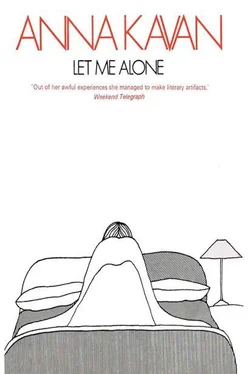‘This is the one,’ said Catherine, looking at Anna as if she were a child. ‘This is the one you must wear.’
She presented her with a garment of supple black, cut in a simple, slender fashion, with a touch of white, like the jabot of an eighteenth-century beau.
‘It will make you look like a young poet. A little bit precious and a little bit decadent in spite of that unearthly freshness of yours. That’s how I want you to look.’
Anna was in a state of bewilderment. She was very flattered — oh, extremely flattered by Catherine’s attentions. She liked being treated with this sort of eccentric intimacy, being flattered and favoured and a little bit patronized by the other girl’s affection and interest. She felt excited, a bit bewildered, and not quite sure of her own feelings. She was a trifle nervous as Catherine smiled at her out of her bright face, so large-eyed and beautiful with a strange, by-gone beauty, mysterious. Anna had an impulse to run away from the unknown mysteriousness. But a stronger impulse urged her to stay and explore the secret, to sink herself in the mystery till it was mystery no longer, but part of the tissue of her own experience. She felt a kind of intrinsic sympathy with the mystery, whatever it was; a leaning towards it. Nevertheless, Catherine’s personality seemed dubious and unsettling, coming into her quite different mental atmosphere. She was not sure that she liked it, altogether.
Certainly Catherine was distinctly dubious, in the Kavan sense of the word. Anna could imagine Matthew’s verdict of her: ‘Fast, shady-looking, rakish’ — and the rest.
There really was something disturbing about the tall, handsome girl, wrapped in the dark cloak, and flashing her red smile like a sword. Queer, how sinister she managed to look, in spite of her young beauty. She had the beauty of clandestine things, things hidden behind everyday life, inauspicious.
Anna was attracted by her brilliant, Venetian look. Yet she was convinced that behind it lay something sinister. Catherine was the first person in whom she had ever encountered this peculiar suggestion of fundamental dangerousness. She watched her warily, somewhat repelled, yet with a strange, inevitable fascination, attracted by her. Attracted by what — to what?
That night the guests at the party had the entertainment of a new combination: Catherine, in her clinging, gold dress, with her great dark eyes, so bold and yet so secret-looking, her odd look of heaviness that had nothing to do with her slim body, the dangerous heavy look, brilliant and proud; and Anna, straight and severely-dressed, with a sort of half-nervous reticence about her, and an indifference that was miles away from Catherine’s haughty nonchalance. There was a great difference between the two girls; and yet, strangest thing of all, a sort of resemblance. It was difficult to say what they had in common. But some similarity there was. Perhaps it was the coldness in both of them, and then the hardness, and the suggestion of something unknown that set them, each in her different way, apart. Anyhow, there it was. The same brush had touched them both.
Anna enjoyed the party. Coming with Catherine, she was an important guest. She received a good deal of attention and was treated with respect, as a friend of Catherine’s, and, in her own right, as an effective type. She was happy in the unconventional, casually intellectual atmosphere. She liked it. Usually, in collections of people, she was lost. She was too much an individualist to shine in a crowd or take kindly to social gatherings. People overshadowed her: made her ineffectual: cancelled her out. Even people she knew well had the power to make her feel unimportant, almost obliterated. She could not hold her own with them.
But this night was otherwise. She was out of herself. As she moved, the dark stuff of her dress — it was a very soft silk, flexible — ran over her limbs like a black fluid concealing her. She liked the feel of the silk flowing so softly dark about her body. She felt herself disguised. This night was not in her life. It was a moment isolated and unmarked. While she talked, she did not feel any self-consciousness, only excitement.
The reaction came in the morning. Then the realization of her own loneliness came over her, she knew herself among strangers. What strangers they were to her, Catherine and the rest! She was so far away from them, with their bold, showy, shallow intellectualism, that seemed simply an affectation. She had not learnt the patter. She did not know how to work the trick. So she felt at a disadvantage. She had committed unpardonable offences of stupidity, bad taste and Philistinism, according to their code. She was married to a nonentity: she was about to go and live in an uncivilized land. She was outside the pale. Even with Catherine, who admired her and treated her as a person of importance, she felt inferior, almost ashamed. She had disgraced herself by Catherine’s standards. So she was in a hurry to get away.
She was up early, and ready to depart. It was a cold, grey morning, threatening rain. Anna went to say goodbye to Catherine, who was sitting over some books near the fire. There was a feeling of anti-climax.
Catherine did not move from her chair. She was paler and quieter, much less dangerous, in her morning clothes, than she seemed in the evening. She looked up at Anna, smiling slightly.
‘Are you going now?’
‘Yes, I think so.’ Anna fingered a book abstractedly. Catherine watched her gravely absent face. What distant, spiritual aloofness there was in Anna. She opened the book and looked at it unseeingly, then turned it between her hands, and finally laid it down on the table.
‘Back to Matthew?’ Catherine asked.
Anna stirred, fidgeting with her hands, and smoothing the fingers of her gloves. She felt awkward and unhappy. Her sense of inferiority made her resentful.
‘Yes, I suppose I shall,’ she said, looking down at the book again. ‘It seems the only thing to do.’
Catherine’s lips curled in a faint ironic smile.
‘The prospect doesn’t enthral you?’
‘No,’ said Anna, coldly admitting the cold fact.
‘But it’s not such a bad prospect,’ said Catherine, who was watching with her great eyes that were like two black holes in her face. Catherine had her private thoughts, and was following them up. ‘It will be amusing for you to travel — to go to a new continent. I rather envy you, in a way.’
‘Do you?’ said Anna, looking at her. ‘Well, I wish I wasn’t going. It’s too much like dying for my fancy: cutting myself off from everything.’
‘Yes. I wish you weren’t going so far away.’
Catherine took Anna’s hand, and suddenly smiled at her, intimately, with her slightly crooked mouth. There was a sudden emotional stress. Anna felt herself flushing.
‘That’s nice of you,’ she said, uncertain.
Catherine continued to hold her hand.
‘It’s true,’ she insisted, strangely emphatic, gazing with a relentless, fixed intensity, significant.
Anna lingered uncomfortably. She glanced at Catherine, but found nothing to say.
‘You must write to me,’ Catherine said. She sat looking at Anna with fixed, dark eyes.
Anna’s discomfort increased under this heavy regard, which made her somewhat abashed. She drew her hand away.
‘Very well,’ she agreed, her voice rather constrained, a half-bashful smile on her mouth.
‘You don’t ask me to write,’ said Catherine, half playful, half heavy, holding her with portentous eyes.
Anna made an impatient movement.
‘Of course I shall be glad if you will. I shall like to get letters.’
The words meant nothing particular to her. She now wished to be gone, embarrassed by the fixed look, which was also starting to irritate her. She retreated into her distant reserve.
Читать дальше












